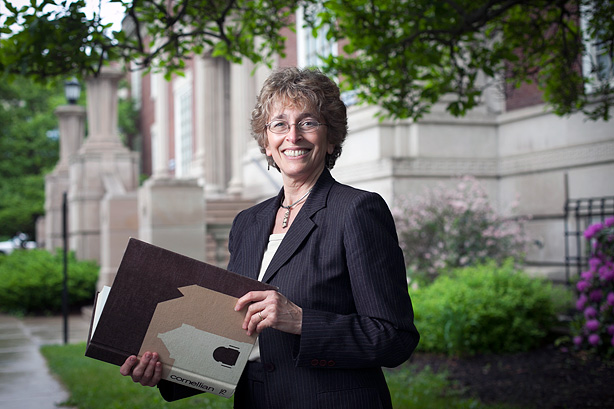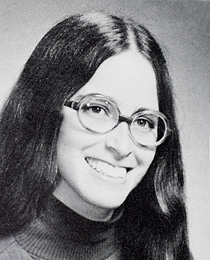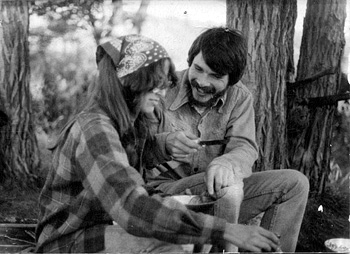
Martha (Oschrin) Robertson '75, chair of the Tompkins County Legislature (pictured in front of the Tompkins County Courthouse), is running for U.S. Congress; she hopes to unseat the incumbent in the 11-county New York 23rd District, which includes Cornell and Tompkins County. Photo: Jason Koski/Cornell University Photography.
Alumna seeks to turn Big Red's congressional seat blue
In this graduation season full of anxious young souls pondering their futures, new graduates might feel less stressed if they viewed their upcoming careers as a road that will reveal itself in due time.
Take Martha (Oschrin) Robertson '75, now in her fourth career at age 62. With her Cornell degree in early childhood education, she taught kindergarten for five years. She never could have predicted that some 35 years later, she'd be chairing the Tompkins County Legislature and running for U.S. Congress in Cornell's home district.
Although it is still 18 months until the election, she already has the attention of the Democratic Congressional Campaign Committee and EMILY'S List (a well-funded progressive women's PAC), which have identified her race as one of six particularly important contests with Republican incumbents.

Martha (Oschrin) Robertson in her Cornell yearbook picture. She graduated from the College of Human Ecology in 1975 and started as a kindergarten teacher, the first of four careers over the past 38 years.
Cornell influence
A scholarship student at Cornell, Robertson worked for the iconic developmental psychologist Urie Bronfenbrenner, who was preparing to be in the first group of scholars to visit China in 1973. "My job was to read as much as I could find about Chinese families and prepare Urie for his trip," Robertson says.
She was also part of Cornell's Human Affairs Program, an early town-gown service program that got students into the community. "It was my first experience confronting theory -- how things were supposed to be -- with how they were in the real world," she says.
Soon after graduation, she married graduate student Steve Robertson, Ph.D. '77, who later became a Cornell professor -- now in his 25th year; they have two grown children and two grandsons. After teaching kindergarten, she launched a museum exhibit business, then raised funds for community service-oriented nonprofits and later headed up the President's Council for Cornell Women (2000-02).
"These women are fantastic -- accomplished and generous with each other. They are models in leadership, which for them means putting out hands to the next generation," Robertson says. She added that women today are still a tremendously "underutilized resource" who as entrepreneurs could stoke the economy. "We need to look for ways to encourage and support women to bring ideas to market," she says.
Local public service
Her own career path took a sharp turn soon after Tompkins County announced plans to build a major bypass road in 2000 to connect the highways from the Pyramid Mall just outside Ithaca to Route 79. She took on a major leadership role in the community's response.
"The road would have really hurt downtown local businesses and torn through environmentally sensitive areas. So we worked with county officials to find other ways to ease traffic through the neighborhoods near Cornell while still protecting local businesses," she says.
As a result Robertson was asked to run for local office. She became the first woman and the first Democrat to represent her county legislative district in 2002. With bipartisan support, she's been elected chair of the legislature each of the last four years. She has worked on some eight county committees and two state councils over recent years -- from public safety and human services to planning and economic development.
Cornell-community collaborations

Robertson married graduate student Steve Robertson, Ph.D. '77, who later became a Cornell professor. Above: The couple in 1976.
Robertson noted many collaborations with Cornell -- including partnering with TCAT public transportation, developing growth strategies for how Ithaca could become one of New York's "innovation hot spots" and brainstorming ways to keep students safer in the wake of several alcohol-related deaths. She played a key role in documenting the need for affordable housing and working with Cornell to obtain funding.
"I worked with a class in planning, which documented our acute housing shortage. That led to our staff developing a formal housing needs assessment, which built such a strong case for more housing that developers took serious notice," she says. The current building boom in the county largely stems from that work, she says, which has been supported with a Cornell commitment of up to $1.2 million over six years, tied to specific projects. Robertson also works closely with the university on the Southern Tier Regional Economic Development Council.
The road ahead
Part of the Cornell fabric for more than 30 years, Robertson says she's "passionate about education, from infancy to higher ed. It has to be a priority." She advocates for keeping a lid on or lowering student loan interest rates, for basic as well as applied research, and commercialization of the best ideas. She strongly supports forging ties between the Cornell NYC Tech campus as a business incubator and the Southern Tier, where costs of doing business are much lower than downstate.
Robertson's next goal is to unseat U.S. Rep. Tom Reed (R-Corning), for the mostly rural New York 23rd District, which comprises 11 counties, from Cornell's Tompkins County in the east to Chautauqua County in the west, and north through the Finger Lakes. Her priorities are economic development, education, clean energy, tax reform and protecting the well-being of seniors.
As for those new graduates, she says: "You never know where your interests and passions will take you. You don't have to have it all figured out. Just make one decision at a time. Things evolve. There are many ways to use your skills -- there are millions of ways to contribute."